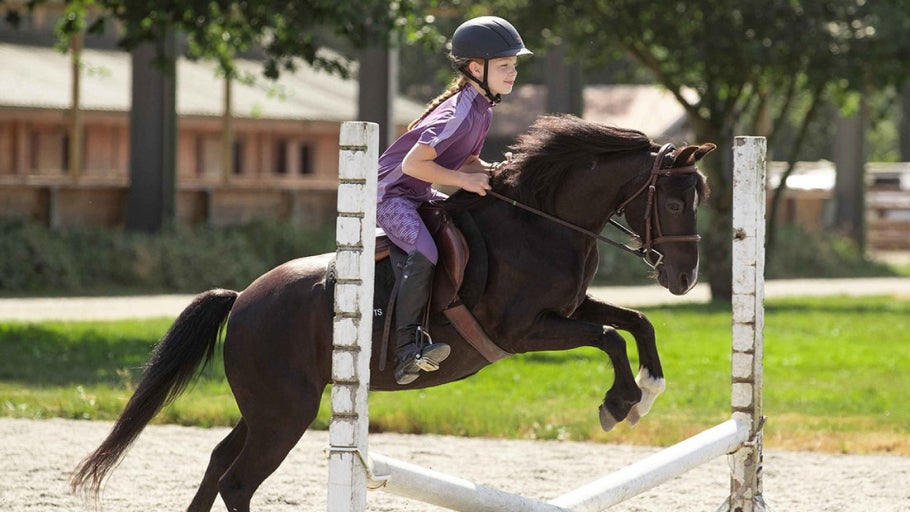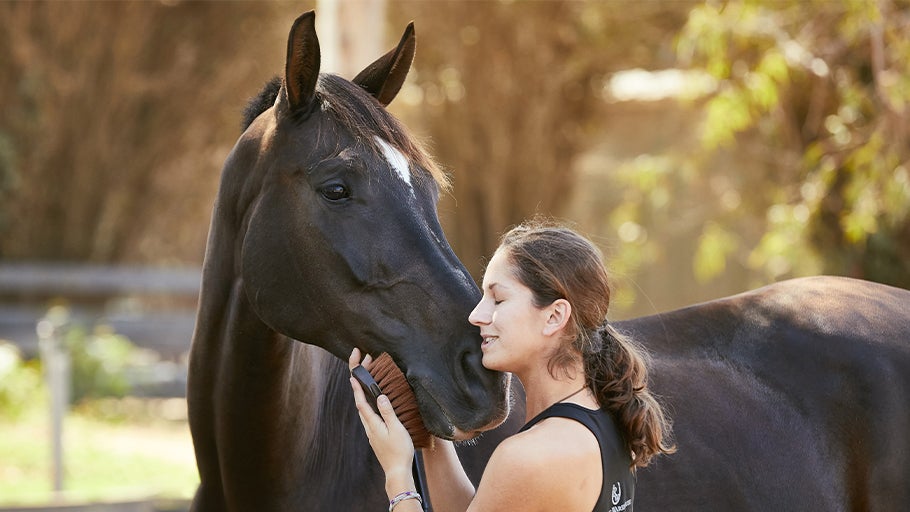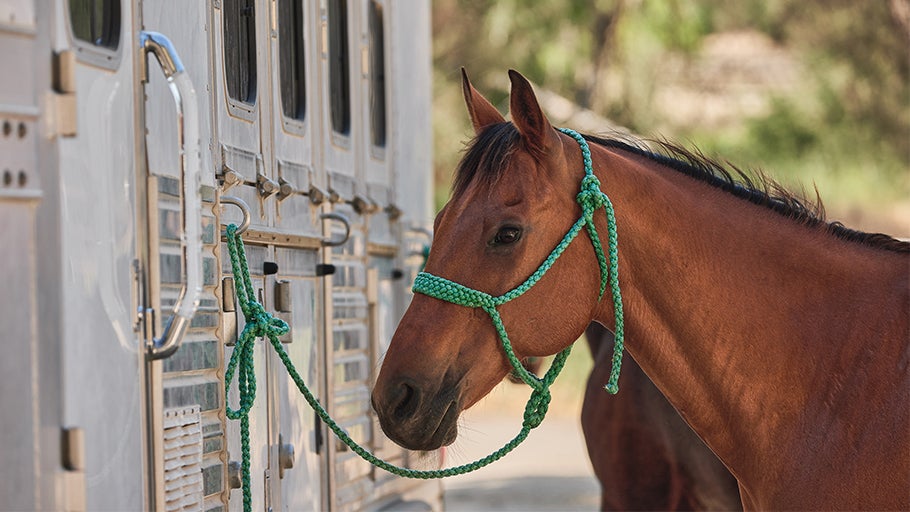
Kids' Horse Camp Essentials: A Complete Guide
As summer vacation rolls around, you're probably searching for a fun activity to keep your little one entertained. Horse camp is the answer you've been seeking! Picture your child spending their days immersed in the world of horses, making new friends, honing their riding skills, and building lifelong memories.
But here's the thing: getting ready for horse camp involves more than you might expect. There are crucial steps to take for camp preparation that many parents overlook at first. Our staff at Riding Warehouse has helped countless parents get their children ready for horse camp, and we'll cover everything you need to know.
Let's saddle up and make sure that your child's horse camp experience is nothing short of incredible!
Benefits of Horse Camp for Children
Attending horse camp offers a wide range of benefits for children that go beyond simply learning to ride. At horse camp, kids develop essential life skills like responsibility, empathy, and teamwork—all the while fostering a deep connection with equines.
Through hands-on activities like grooming, feeding, and riding, children gain a sense of confidence and self-esteem as they master new equestrian skills. Horse camp also provides a unique opportunity for kids to engage with nature and the outdoors, encouraging an active lifestyle and love for the environment.
The structured flow of horse camp promotes discipline and time management, teaching children the importance of commitment and caring for an animal. Additionally, interacting with horses can have a profoundly positive impact on a kid's emotional well-being; scientific studies show that interacting with horses can reduce social anxiety and promote relaxation.
If you're seeking an unforgettable experience for your child that combines fun, education, and personal growth, horse camp could be the perfect choice!
How to Choose a Horse Camp
First things first! Finding a horse camp suited for your child will play a major role in what they ultimately take away from the experience. Below, we address some questions to consider when choosing the right horse camp for your child.
Who are the instructors and are they experienced?
You'll want to check that the instructors teaching your child are experienced to ensure your little one is in a safe and comfortable environment. Ask how many years the instructors have been teaching, if they have insurance, and if they are certified by an organization such as the Certified Horsemanship Association (CHA). Reviews of the instructors and their program can also be beneficial for additional peace of mind. Word-of-mouth recommendations are great, especially if your kiddo will have friends attending the same camp!
What level of instruction is offered?
Make sure you are considering the level of riding and horse management skills the camp will provide. Choosing a camp that emphasizes basic horsemanship skills can be very beneficial if your child is new to horses, so they can learn how to be around horses safely. However, if your child is experienced or takes regular lessons, a camp that is a little more advanced might be a better fit for them.
Are the horses well cared for and is the facility kept up?
Although most of your research will undoubtedly come from the internet, if possible, try to visit the camp in person beforehand. This way you can evaluate the condition of the camp and its horses. The facility should be clean and well cared for, and the horses should look happy, healthy, and well-fed. You can also ask if the horses are owned by the camp itself or just leased out for the summer.
What riding disciplines are offered at camp?
You should consider what style of riding your child would prefer. Some camps are discipline-specific, while others do a mix so your camper can choose which program they would like to participate in.
Day camp or overnight camp?
Summer camps are typically split into two different types: day or overnight. As the name suggests, day camps involve the camper participating in activities during the day and then leaving at night. Some day camps run the entire day while others are just half days. Some provide transportation while others require that the child is dropped off and picked up. If you will be picking your child up each day, you will probably want to find a camp close to home.
Overnight camps involve the campers staying overnight and are usually run in sessions ranging from one to eight weeks. These camps require more planning and packing since your camper will be away for longer. They may also include more activities than just horseback riding, such as hiking, water activities, or games, so you'll want to make sure your child has all the gear they will need.
Questions to Ask Horse Camp Staff
Once you've signed up for a camp, it's time to make sure your child has everything they need to make the experience fun and successful. Here are a few questions for you to ask the instructor or host of the camp:
- What does each day's schedule generally look like?
- Are meals provided by the camp or should my child pack food?
- What should my child bring to camp in terms of gear?
Getting these questions answered will not only put your mind at ease but also ensure you pack the necessary items for your child to have a great time at camp! Continue reading below to see what type of gear you will need, whether it is for a day horse camp or overnight camp.
What to Bring to Horse Camp
Finding the proper equestrian equipment for your child is arguably the most important part of horse camp prep. If they are ill-equipped for riding or not comfortable in their gear, this can lead to issues with their safety, skill development, and overall experience.
If your child is bringing their own horse to camp, they will probably use their own tack and equipment. If horses are provided, the camp will likely have their own tack for each horse. Depending on whether it's a day or overnight camp, a checklist of what your little equestrian needs can be extremely helpful.
Luckily, Kerrits Equestrian has put together a detailed Pony Day Camp Checklist and a Pony Overnight Camp Checklist to make sure your camper leaves home with everything they need. Printing and checking off those lists with your child can be a fun way to get them excited about packing for camp!
If you're not familiar with some of the items on those lists, we'll get into the details of riding equipment and apparel next. You can also use our Kids' Horse Camp Starter Kit and get all your camp supplies in one shop! But first, here's an overview of what your child will need for horse riding camp:
- Horse Tack (if it is not provided)
- Equestrian Helmet
- Riding Boots
- Equestrian Apparel (breeches, shirts, etc.)
- Equestrian Apparel and Gear Storage
- Accessories (riding gloves, socks, etc.)
- Non-Riding Clothes
- Non-Riding Shoes
- Sunscreen, Water Bottle, Sunglasses
- General Camp Items (towel, snacks, etc.)
Safe Riding Helmet
A safe riding helmet is one of the most important pieces of gear you can send your kid to camp with. The best helmet is the one that fits! Your child will be well protected by any helmet, but helmets with an ASTM/SEI safety certification offer an extra layer of protection. A helmet protects your kiddo's noggin in the event of an accidental dismount, so choosing one that has a good safety rating and fits well is imperative.
Are you feeling unsure about what a properly fitted horseback riding helmet looks like? Check out our guide on how to fit a riding helmet for more thorough information.
Comfortable Riding Boots
Your child will need closed-toed riding boots with a heel for proper protection. It's crucial that the boots fit well and are comfortable for long days at camp! Depending on the type of camp, Western riders generally wear cowboy boots, and English riders wear paddock or tall boots. If the camp doesn't have a preference, just go with what your kiddo likes best!
When choosing a cowboy boot, pick a comfortable style with either a round or square toe. Some cowboy boots are even designed with detailed shafts to show off your child's personal style! Check out our complete guide to cowboy boots for more information on choosing the right boot.
Paddock boots are ankle-high boots that come in both zip and lace versions. Paddock boots can be worn alone or paired with half chaps, which protect your child's legs from any rubbing and pinching from the saddle. Tall boots are a combination of a paddock boot and half chap, and they also protect the calf from being pinched and rubbed. As tall boots typically require a break-in period, we don't suggest them for camp unless your child already has pair and is currently riding in them. For more information on tall boots, check our guide to measuring and fitting tall boots.
Regardless of which type of footwear your child wears, adding a good pair of socks will make any riding boot more comfortable! Choose from short or tall styles, which can coordinate with cowboy, paddock, or tall boots.
Appropriate Riding Clothes
Your child should be appropriately dressed in riding apparel designed for the sport of horseback riding. Depending on which discipline your child will be riding and their preference, you may choose to send them in riding tights, breeches, or jeans. Western riders typically ride in jeans while English riders opt for breeches and tights.
For riding shirts, choosing a top with UPF protection is a great way to shield your little one from the sun's UV rays! These shirts are designed with lightweight fabric and are highly breathable, making them perfect for warm-weather riding and active children.
If you are looking for more information on kids' summer riding clothes, Kerrits Equestrian spells it all out! Doted the "unofficial riding camp uniform," Kerrits has everything to keep your little one cool and comfortable. Check out our Kerrits kids' breech and tight buying guide to learn more about the brand and what riding pants they recommend.
Helpful Accessories
Don't forget a good pair of socks, riding gloves, and maybe an insulated water bottle! Having some helpful accessories can make all the difference during your kid's camp experience. Do you have a blue-eyed babe or child who gets easily sunburned? They should also be accessorized with sunglasses, hats, and anything else necessary to protect them during long days in the sun!
Mentally Preparing Your Child for Camp
Once you and your child have double-checked your equipment list, it's time for some mental prep. Attending a horse camp can be an exciting but nerve-wracking experience for children. Be sure to ask your child what they are excited for, and if they're feeling nervous about anything. Addressing their concerns beforehand and giving your kiddo an idea of what to expect at horse camp can go a long way!
Let your child know what the schedule will be like and how long they will be at the barn each day. Remind them that even when they get tired, it's important to maintain a good attitude and keep an open mind when learning. Most importantly, your little equestrian should be ready to meet new friends and have so much fun!
Frequently Asked Questions
Is horseback riding experience necessary for my child to attend a horse camp?
No, horseback riding experience is not always necessary. Different equestrian camps cater to children with varying levels of experience, from beginners to more advanced riders.
What safety measures should I look for when choosing a horse camp?
Look for camps that prioritize safety by employing qualified instructors, using well-trained horses, and having proper safety equipment. Additionally, you can ask questions to learn about the emergency protocols in place and staff-to-camper ratios.
How can I help my child overcome homesickness during horse camp?
Encourage your child to stay connected with home through letters, phone calls, or video chats. Remind them of the exciting experiences awaiting them at camp and reassure them with your support. By picking the right horse camp for your little rider, they are going to feel more comfortable during their experience—despite any homesickness!
Closing Thoughts
Enrolling your child in a horse camp can be a transformative and memorable experience. By choosing the right horse camp, packing the essentials, ensuring safety, and making sure your child is mentally prepared, you can make the most out of your child's horse camp experience and empower them to embrace the joys of horsemanship!
We hope this guide has helped you feel more confident in sending your child on an adventure-filled journey, where they will create lasting memories, develop new skills, and forge connections with both horses and fellow campers. Should you have any questions, please do not hesitate to contact our friendly customer service team at 1-800-620-9145 or info@ridingwarehouse.com. Happy camping!
Related Articles





